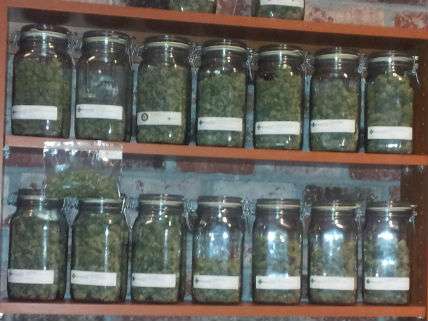Nonmedical Marijuana Use Is (Mainly) Recreational, So Why Not Call It That?
Fear of fun can be found on both sides of the legalization debate.

This month Nevada's medical marijuana dispensaries began serving all consumers 21 or older, not just patients with doctor's recommendations. The name for this new sort of cannabis commerce, according to Question 2, the 2016 ballot initiative that legalized it, is "retail marijuana," a term that fails to distinguish between medical use, which has been allowed in Nevada since 2001, and nonmedical use, which is newly legal. Question 2 also refers to "personal use," which likewise does not elucidate the change made by the initiative.
This fuzziness is no accident. So far eight states (Alaska, California, Colorado, Maine, Massachusetts, Nevada, Oregon, and Washington) and the District of Columbia have approved general legalization of marijuana, all by ballot initiative. All of those measures avoid mentioning recreational use, preferring vague euphemisms such as retail, personal, and adult.
Reformers who eschew recreational have several concerns. Some worry that it sounds frivolous, while others say it is imprecise, since nonmedical use encompasses, say, spiritual or artistic purposes that may not fit comfortably in the category of recreation. But probably the most common objection is that recreational scares voters, as Dale Sky Jones, chancellor of Oaksterdam University, argued in a 2016 interview:
When they hear "recreational," they think about what their children are doing, because recreational is fun. It's Disney World, playtime, going to some park. That's recreation. Go ice skating. That's recreation. Why are we making this sound fun to children when the specific point here is to keep it away from children? We need to stop calling it "recreational cannabis." This is cannabis for adults. It's retail. It's commercial. It is not recreational….
Please stop calling it "recreational." Not only are you making it sound fun to the very group of people that we don't want consuming this for fun, but you're also scaring the soccer moms that are going out to vote.
Although I'm skeptical that most children or adolescents think "fun" when they hear the word recreational, Jones may be right that the adjective alienates soccer moms. Still, marijuana is fun (among other things), and recreational is the most apt way to capture that aspect of it. The word also encompasses the use of cannabis as a social lubricant and an aid to relaxation. Those three functions surely account for the vast majority of nonmedical use, making the term pretty precise as well as honest.
It cannot be said too often that there is nothing shameful or morally suspect about fun, although same varieties of it may not be appropriate for minors. Support for drug prohibition is based largely on the assumption that there is something wrong with chemically assisted pleasure, as reflected in recent comments by Scott Chipman, Southern California chairman for Citizens Against Legalizing Marijuana. "'Recreational' is a bike ride, a swim, going to the beach," Chipman told The New York Times, sounding remarkably like Dale Skye Jones. "Using a drug to put your brain in an altered state is not recreation. That is self-destructive behavior and escapism."
I do not know whether Chipman thinks drinking is immoral or that alcohol should be banned for similar reasons. But even assuming he does, his line drawing seems arbitrary. Whether cannabis consumption (or drinking) is in fact self-destructive depends on the context in which it occurs. The fact that it can lead to injury does not distinguish it from riding a bike, swimming, or visiting the beach.
As for "escapism," Chipman's preferred forms of recreation surely can provide an escape from quotidian concerns, as can reading a book, watching a TV show or a movie, listening to music, playing poker or video games, hiking, skiing, riding roller-coasters, or any of the myriad other enjoyable activities in which people engage when they are not working. The fact that Chipman deems cannabis consumption especially objectionable may tell us something about his own tastes, there is no reason the rest of us should be morally or legally bound by them.


Show Comments (24)